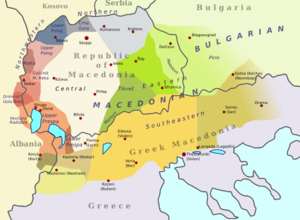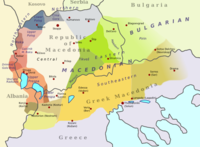| Revision as of 17:07, 5 April 2013 editLocal hero (talk | contribs)Extended confirmed users22,135 edits rv, this dialect only belongs to Macedonian← Previous edit |
Revision as of 09:32, 28 April 2013 edit undo124.168.244.153 (talk) →Phonological characteristicsNext edit → |
| Line 7: |
Line 7: |
|
|
|
|
|
The phonological characteristics of the Bitola-Prilep dialect which also can also be found in the other peripheral dialects are: |
|
The phonological characteristics of the Bitola-Prilep dialect which also can also be found in the other peripheral dialects are: |
|
*mostly ] word stress (see ]) |
|
*mostly ] word stress (see ]); |
|
*the ] has reflexed into {{IPA|/ɛ/}} |
|
*] *ǫ has reflexed into {{IPA|/a/}}: |
|
|
::rǫka > ''рака'' {{IPA|/ˈraka/}} ('hand') |
| ⚫ |
*as in most South(-Western) dialects, the central vowel {{IPA|/a/}} is more fronted (i.e. a cardinal {{IPA|}}) rather than the more central {{IPA|}} typical of other dialect groups |
|
|
|
*except for the Prilep sub-dialects, Bitola sub-dialects have two phonemic ]s ({{IPA|/ɫ/}} and {{IPA|/l/}}, continuants of Proto-Slavic *l and *ĺ): |
| ⚫ |
*the palatal affricates are typically prepalatalized: {{IPA|/ˈsvɛca/}} is realized {{IPA|}}, {{IPA|/ˈmɛɟa/}} is realized {{IPA|}} |
|
|
|
::ex. Proto-Slavic *kĺučь > {{IPA|}} in Bitola sub-dialects, {{IPA|}} in Prilep sub-dialects |
| ⚫ |
*similarly, the palatal nasal is also prepalatalized: {{IPA|/ˈjadɛɲɛ/}} is realized {{IPA|}} |
|
|
|
*while most Macedonian dialects have a phonemic {{IPA|/f/}} (in loanwords), many sub-dialects of the Prilep-Bitola dialect—with the exception of urban prestige dialects—instead have {{IPA|/v/}}: |
| ⚫ |
* consonant ] is typical of this dialect and occurs in the following environments: |
|
|
|
::] ''fustan'' {{IPA|/ˈfustan/}} > ''вустан'' {{IPA|/ˈvustan/}} ('ladies' dress') |
| ⚫ |
**the etymological {{IPA|/v/}} in initial position has been lost in a number of instances: |
|
|
|
::] فوطة {{IPA|/ˈfuta/}} > ''вута'' {{IPA|/ˈvuta/}} ('apron') |
| ⚫ |
***in the sequences ''*vs-'' and ''*vz-''; e.g. ''*vse'' > {{IPA|/sɛ/}} (''сè'', "all"), ''*vzema'' > {{IPA|/ˈzɛma/}} (''зема'', "to take") as is the case in the standard |
|
|
|
::Ottoman Turkish فرنا {{IPA|/ˈfuɾna/}} > ''вурна'' {{IPA|/ˈvurna/}} ('], ]') |
|
***in a handful of other words: {{IPA|/ˈtɔrnik/}} for standard {{IPA|/ˈftɔrnik/}} (''вторник'', "Tuesday"), {{IPA|/ˈnatrɛ/}} for standard {{IPA|/ˈvnatrɛ/}} (''внатре'', "inside") |
|
|
⚫ |
*as in most South(-Western) dialects, the central vowel {{IPA|/a/}} is more fronted (i.e. a cardinal {{IPA|}}) rather than the more central {{IPA|}} typical of other dialect groups; |
|
****the same process (bringing the pronunciation closer to their antonyms) also occurred with {{IPA|/ˈmnɔɡu/}} (''многу'', "much", "a lot") → {{IPA|/ˈnɔɡu/}} |
|
|
⚫ |
*the palatal affricates are typically prepalatalized: ''свеќа'' {{IPA|/ˈsvɛca/}} ('candle') is realized as {{IPA|}}, ''меѓа'' {{IPA|/ˈmɛɟa/}} ('border, frontier') is realized as {{IPA|}}; |
|
**absence of the intervocalic {{IPA|/v/}} |
|
|
⚫ |
**a similar features occurs with the palatal nasal: ''јадење'' {{IPA|/ˈjadɛɲɛ/}} ('food') is realized as {{IPA|}}; |
| ⚫ |
*** in the plural forms of monosyllabic nouns, e.g. лебо(в)и:<ref>Граматика на македонскиот литературен јазик, Блаже Конески, Култура, Скопје 1967, стр.68</ref> |
|
|
⚫ |
*the etymological {{IPA|/v/}} in initial position has been lost in a number of instances: |
| ⚫ |
****{{IPA|/ˈlɛbɔvi/}} → {{IPA|/ˈlɛbɔi/}} (realized {{IPA|}}) |
|
|
⚫ |
**in the sequences ''*vs-'' and ''*vz-'', as is the case in the standard; e.g. ''сè'' {{IPA|/sɛ/}} ('all') from the earlier *''все'', ''зема'' {{IPA|/ˈzɛma/}} ('to take') from the earlier *''взема''; |
| ⚫ |
*** and in most other positions, e.g. то(в)ар:<ref>Историја на македонскиот јазик, Блаже Конески, Култура, Скопје 1986, стр. 21</ref> |
|
|
|
**in a handful of words where the pronunciation was "evened up" with that of their antonyms: ''натре'' {{IPA|/ˈnatrɛ/}} from the earlier ''внатре'' {{IPA|/ˈvnatrɛ/}} ('inside') as per ''надвор'' {{IPA|/ˈnadvɔr/}} ('outside'), ''ногу'' {{IPA|/ˈnɔɡu/}} from the earlier ''многу'' {{IPA|/ˈmnɔɡu/}} ('much, a lot') as per ''малку'' {{IPA|/ˈmalku/}} ('a little'); |
| ⚫ |
****{{IPA|/ˈtɔvar/}} → {{IPA|/ˈtɔar/}} (realized {{IPA|}}) |
|
|
⚫ |
*intervocalic consonant ] is typical of this dialect, and elided forms are in ] with non-elided forms: |
| ⚫ |
** certain short words (conjunctions, pronouns, adverbs, determiners, etc.) have undergone further elision, ex.: |
|
|
*** ''sega'' → ''sea'' → {{IPA|/sa/}} ("now") |
|
**elision of the intervocalic {{IPA|/v/}}: |
|
⚫ |
***in the plural forms of monosyllabic nouns, e.g. ''лебо(в)и'':<ref>Граматика на македонскиот литературен јазик, Блаже Конески, Култура, Скопје 1967, стр.68</ref> |
|
*** ''tova'' → ''toa'' → {{IPA|/tɔ/}} ("that") |
|
|
*** ''koga'' → ''koa'' → {{IPA|/kɔ/}} ("when") |
|
::::{{IPA|/ˈlɛbɔvi/}} → {{IPA|/ˈlɛbɔi/}} (realized as {{IPA|}}) |
|
⚫ |
::* and in most other positions, e.g. ''то(в)ар'':<ref>Историја на македонскиот јазик, Блаже Конески, Култура, Скопје 1986, стр. 21</ref> |
| ⚫ |
*insertion of {{IPA|/t/}} and {{IPA|/d/}} into consonant clusters {{IPA|/sr/}}- and {{IPA|/zr/}}-, respectively; for example, {{IPA|/stram/}} for the standard {{IPA|/sram/}} (''срам'', "shame") and {{IPA|/zdrɛl/}} for the standard {{IPA|/zrɛl/}} (''зрел'', "ripe") |
|
|
⚫ |
::::{{IPA|/ˈtɔvar/}} → {{IPA|/ˈtɔar/}} (realized as {{IPA|}}) |
|
⚫ |
:* certain short words (conjunctions, pronouns, determiners, etc.) have undergone further elision, ex.: |
|
⚫ |
::: {{IPA|/ˈsɛga/}} (→ {{IPA|/ˈsɛa/}}) → {{IPA|}} ('now') |
|
|
::: *{{IPA|/ˈtɔva/}} (→ {{IPA|/ˈtɔa/}}) → {{IPA|}} (''indic. pron.'' 'that') |
|
|
::: {{IPA|/ˈkɔga/}} (→ {{IPA|/ˈkɔa/}}) → {{IPA|}} (''interr. pron.'' 'when') |
|
⚫ |
*insertion of {{IPA|/t/}} and {{IPA|/d/}} into consonant clusters -{{IPA|/sr/}}- and -{{IPA|/zr/}}-, respectively; for example, {{IPA|/stram/}} from the earlier {{IPA|/sram/}} (''срам'', 'shame') and {{IPA|/zdrɛl/}} from the earlier {{IPA|/zrɛl/}} (''зрел'', 'ripe'). |
|
|
|
|
|
|
|
*In the sub-dialect of ]-], especially among the oldest generations: |
|
*In the sub-dialect of ]-], especially among the oldest generations: |
|
**while {{IPA|}} is an allophone of {{IPA|/l/}} in most dialects (occurring in all positions except before front vowels and {{IPA|/j/}}, in this dialect {{IPA|}} is used instead: e.g. {{IPA|}} for {{IPA|}} (''глава'', "head") and {{IPA|}} for {{IPA|}} (''слама'', "straw")) |
|
**while {{IPA|}} is an allophone of {{IPA|/l/}} in most dialects (occurring in all positions except before front vowels and {{IPA|/j/}}), in this dialect {{IPA|}} is used instead; ex.: |
|
|
:::{{IPA|}} for {{IPA|}} (''глава'', 'head') and {{IPA|}} for {{IPA|}} (''слама'', 'straw') |
|
**the etymological {{IPA|/a/}} mutates (is raised) to {{IPA|}} ({{IPA|}} ~ {{IPA|}}) when preceding an ] or ] consonant, e.g. {{IPA|}} for {{IPA|/ˈt͡ʃaʃa/}} (''чаша'', "cup") |
|
**the phoneme {{IPA|/a/}} mutates (is raised) to {{IPA|}} ({{IPA|}} ~ {{IPA|}}) when preceding an ] or ] consonant with the exception of suffixes; ex.: |
|
|
:::''чаша'' {{IPA|/ˈt͡ʃaʃa/}} ('cup') is realized as {{IPA|}} |
| ⚫ |
**the ] syllabic ''*l̥'' has reflexed into {{IPA|/ə/}}, e.g. {{IPA|/ˈsənt͡sɛ/}} ("sun") for the standard {{IPA|/ˈsɔnt͡sɛ/}} and {{IPA|/vək/}} ("wolf") for the standard {{IPA|/vɔlk/}} |
|
|
|
:::''жаба'' {{IPA|/ˈʒaba/}} ('frog') is realized as {{IPA|}} |
|
⚫ |
**the ] syllabic *l̥ has reflexed into {{IPA|/ə/}}, e.g. *sъlnьce > {{IPA|/ˈsənt͡sɛ/}} ('sun'), *vьlkъ > {{IPA|/vək/}} ('wolf'). |
|
|
|
|
|
==Morphological characteristics== |
|
==Morphological characteristics== |
The phonological characteristics of the Bitola-Prilep dialect which also can also be found in the other peripheral dialects are:

